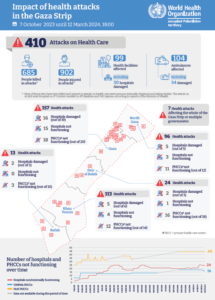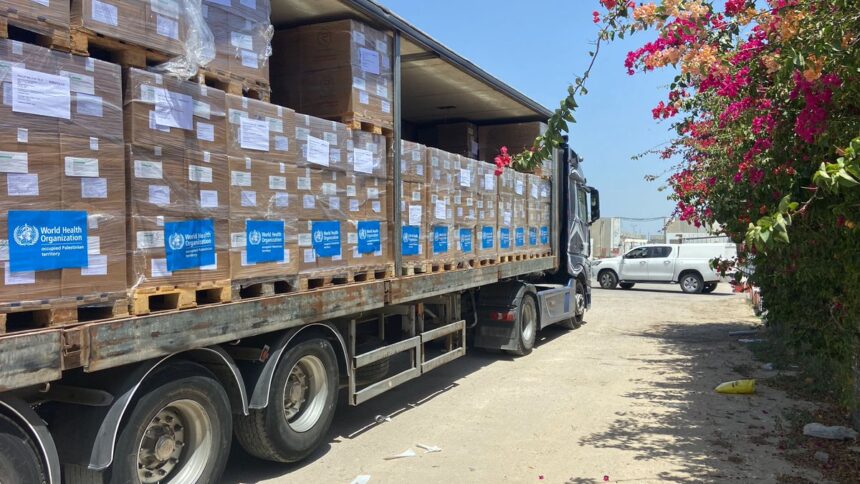
Ornella Moreno Mattar is an experienced health administrator with extensive expertise in health systems management, public policy, and health economics. She holds advanced degrees in Government, Public Policy, and is pursuing a PhD in Political Science. Ornella’s professional journey includes significant roles in various governmental and regulatory organizations. She focuses on policy formulation, regulation of pharmaceuticals and medical devices, and economic impact analysis in health. She has contributed to numerous publications on health equity, strategic purchasing in healthcare, and integrating patient preferences into health benefit plans. Ornella is committed to enhancing global health systems through meticulous research and informed analysis.
International humanitarian law (IHL) protects medical personnel in armed conflicts to ensure they can perform their duties without interference. Rule 25 of customary IHL states that healthcare personnel must be respected and protected in all circumstances. This mandate includes the prohibition of attacking, capturing, or intentionally harming medical professionals. Protection extends to medical equipment and vehicles as well.
Adhering to these rules is crucial to ensure that victims of armed conflicts receive the necessary medical care, which is fundamental to preserving human dignity and mitigating suffering in times of war. Violations of these norms not only exacerbate humanitarian crises but also constitute serious breaches of IHL, which can be prosecuted as war crimes.
However, ensuring this right becomes a monumental challenge. In conflict zones, hospitals and health centers often become targets of attacks. The destruction of these facilities deprives local communities of essential medical services and discourages medical personnel from remaining in the region.
Access to medical supplies is another major challenge in conflict zones. Supply chains are disrupted, making delivering medications, equipment, and other necessary resources difficult. In Yemen, for example, the civil war has led to a critical shortage of basic medications and medical equipment, exacerbating the country’s humanitarian crisis.
Similarly, insecurity and violence force many healthcare professionals to flee conflict zones, leaving communities without skilled personnel. In countries like South Sudan and Syria, where civil war has devastated the healthcare system, there is an alarming shortage of doctors and nurses, worsening the public health situation.
The war in Syria has been one of the most devastating in terms of impact on health infrastructure. A World Health Organization (WHO) report indicated that between 2016 and 2019, over 494 attacks on health facilities were recorded in Syria, resulting in a severe healthcare crisis. Many hospitals have been destroyed or severely damaged, and the lack of access to medical care has resulted in increased mortality from preventable and treatable diseases. According to Physicians for Human Rights, “at least 949 medical professionals have been killed in Syria from 2011 through March 2024”.
As in Syria, the war in Yemen has led to a humanitarian catastrophe, with millions of people urgently needing medical care. The destruction of infrastructure and lack of supplies have worsened health conditions, with outbreaks of diseases like cholera claiming thousands of lives. Likewise, the conflict in South Sudan has left the country with one of the most fragile healthcare systems in the world. The shortage of facilities, supplies, and medical personnel has led to high maternal and infant mortality rates. International organizations are working hard to fill this gap, but the situation remains critical.
The health situation in Gaza is extremely precarious; recurrent bombings and blockades have left the health system on the brink of collapse. The lack of medications, equipment, and movement restrictions on patients and medical personnel have worsened conditions. International organizations and UN agencies have tried to mitigate this crisis.
The situation in Gaza remains critical, with hospitals frequently overwhelmed by the high number of patients and the severity of their conditions. Since October 7th, the WHO has documented 410 attacks on healthcare facilities in the Gaza Strip, resulting in 685 fatalities, 902 injuries, damage to 99 facilities, and the impact on 104 ambulances. The attacks were distributed as follows: 38% in Gaza City, 23% in North Gaza, and 28% in Khan Younis.
It is essential that parties in all these conflicts respect international humanitarian law and protect health facilities. The international community must press for these norms to be upheld and for those who violate them to be sanctioned. Additionally, humanitarian corridors must be established to ensure the safe and continuous access of medical supplies to conflict zones. International organizations must collaborate to coordinate these efforts and ensure resources reach those most in need.
Training and supporting local medical personnel are essential. International organizations can provide training and resources so local health professionals can continue their work under difficult conditions. Furthermore, offering psychological and emotional support to these professionals, who often work in extreme conditions, is crucial.

Effect of health attacks in Gaza. Graph by World Health Organization
Technology can play a crucial role in delivering medical care in conflict zones. For instance, telemedicine enables doctors to provide remote consultations and diagnoses, overcoming physical and security obstacles. This can be a practical way to enhance access to medical care in areas with adequate technological infrastructure. However, in many war-affected regions, this is not feasible.
It is crucial to design and build health facilities that are resilient and able to function during crisis situations. This involves constructing mobile hospitals and utilizing temporary structures that can be rapidly deployed and withstand the impacts of conflicts. Additionally, it’s important to ensure the security of health professionals working in the field of war.

